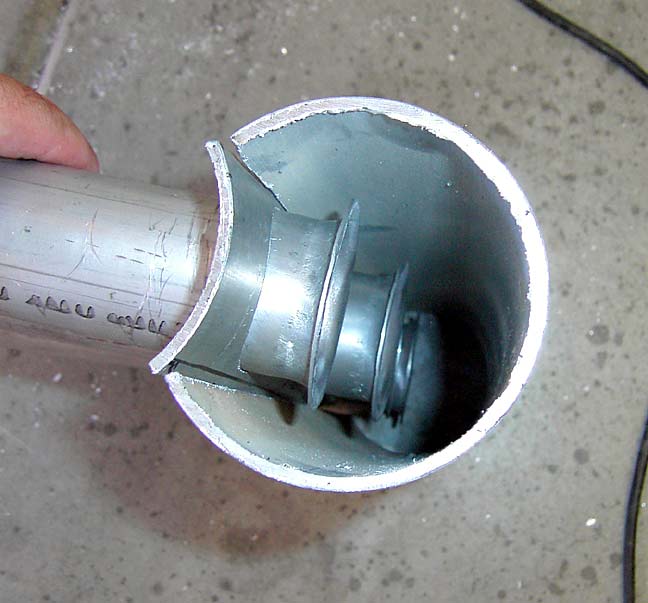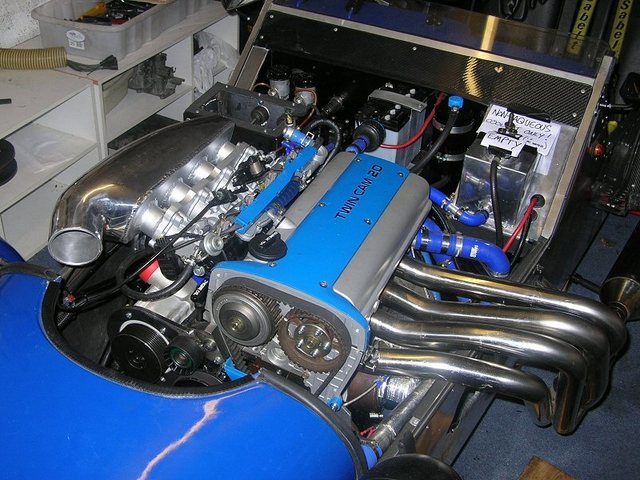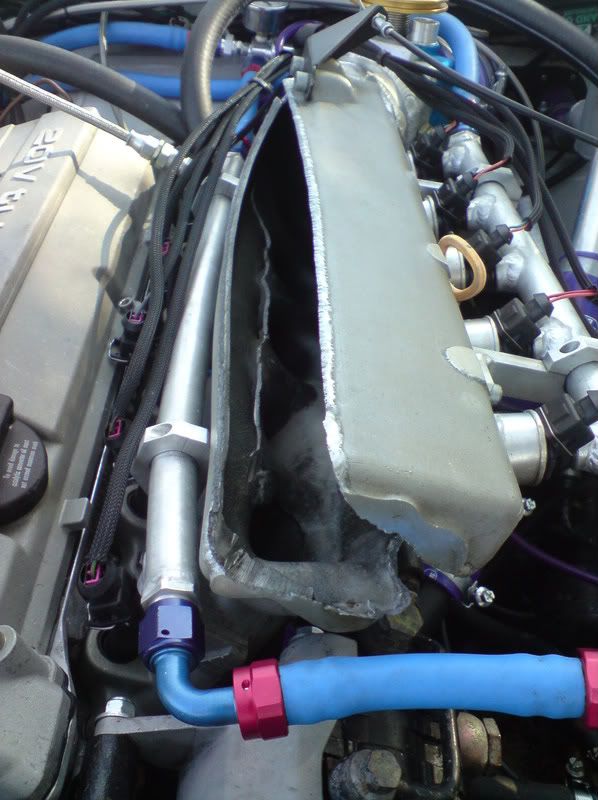BenB
|
| posted on 19/2/09 at 12:14 PM |

|
|
What thickness ali for plenum chamber
I'm making my own plenum chamber for the BEC EFi conversion. Only issue (actually if only it was!!!) is what thickness to make the plenum
chamber out of.
The plenum chamber is going to be a rectangular box approx (in mm) 150 wide, 100 tall, 200 deep.
But- I'm going forced induction at some point so it needs to take 10PSI...
Is 2mm way too thin? I'm thinking 3mm at the moment. Obviously it can't have any internal ribs to strengthen it so it's effectively
a pressurized can!! Don't want it going pop.... Not sure if final structural analysis will deal with this kind of thing (though I have no
knowledge of FSA!!!)....
I'm going to be tack welding it with MIG on the spare engine (argon + proper wire of course) then taking it to my brothers place to be tigged.
Unless my brothers TIG is out of action in which case I'll technoweld it.
I was going to use 100mm wide 2mm tube (circle being strongest blah blah blah) to make a log plenum but trying to get it all to fit and still allow
trumpets made the inlets pretty tortuous which obviously ain't that great... So it's flat sides to the box now...
What does anyone reckon???
|
|
|
|
|
Mr Whippy
|
| posted on 19/2/09 at 12:16 PM |

|
|
many production cars now use plastic ones and their hardly that thick either so I'd just use 2mm, tbh I'd just make it all out of steel
and paint it silver 
[Edited on 19/2/09 by Mr Whippy]
|
|
|
BenB
|
| posted on 19/2/09 at 12:29 PM |

|
|
I could make it from steel (I could after all make it thinner so it wouldn't end up that much heavier. But it would still be
heavier.....
I was initially making it out of plastic pipework but despite each individual bit being quite light the end result was blooming heavy.... The plenum
chamber is going to be pretty high up on the car so I want it to be light....
[Edited on 19/2/09 by BenB]
|
|
|
Phil.J
|
| posted on 19/2/09 at 12:31 PM |

|
|
For a forced induction application I would use 3mm hard aluminium. Work out the surface area of the chamber in sq. in. and multiply this by 10psi,
you'll be surprised at the force it has to contain.
|
|
|
BenB
|
| posted on 19/2/09 at 12:40 PM |

|
|
quote:
Originally posted by Phil.J
For a forced induction application I would use 3mm hard aluminium. Work out the surface area of the chamber in sq. in. and multiply this by 10psi,
you'll be surprised at the force it has to contain.
208 square inches
2080 pounds!!! Ouch!! (unless I'm making a mistake somewhere) =943kg for those metric people out there....
[Edited on 19/2/09 by BenB]
|
|
|
MikeRJ
|
| posted on 19/2/09 at 12:52 PM |

|
|
quote:
Originally posted by Mr Whippy
many production cars now use plastic ones and their hardly that thick either so I'd just use 2mm, tbh I'd just make it all out of steel
and paint it silver 
How many production turbocharged cars use plastic plenums? Also OEM plenums are generaly round in section, so very strong under pressure. A flat
sided plenum will be much weaker.
|
|
|
tegwin
|
| posted on 19/2/09 at 01:03 PM |

|
|
As above... would you not be better off using an ali pipe with tubes comming off it to your Tbs?...
Much stronger... you are opening yourself up to weakness in the corners with that much pressure!
------------------------------------------------------------------------------------------------------------------------
Would the last person who leaves the country please switch off the lights and close the door!
www.verticalhorizonsmedia.tv
|
|
|
BenB
|
| posted on 19/2/09 at 01:09 PM |

|
|
Absolutely!! Trouble is that might mean no trumpets 
Grrrr... I'll go do some more measurements. Looks like I need 2.5mm thick sheet if I go for square!!! 
|
|
|
Mr Whippy
|
| posted on 19/2/09 at 01:10 PM |

|
|
didn't notice the turbo bit the first time...
do a search on google images, tons of folk making them
how to make one linky



[Edited on 19/2/09 by Mr Whippy]
|
|
|
bimbleuk
|
| posted on 19/2/09 at 01:15 PM |

|
|
From my experience you need to over engineer to avoid problems. My plenum is up to 4mm thick in places and is mostly domed and cast. The only part
which wasn't cast was only 2-3mm thick and failed when NA not even supercharged like it is now! The welds failed around the join between the cast
dome and the flat baffle connecting the trumpets together.
This was partly due to poor welding/material though. Since I had it re-welded and the flat baffle plate increased in thickness its been running up to
1 bar with no further issues.
Oh and the plenum OMEX supply on their Rotrex 4AGE 20V conversion also failed a couple of times in prototyping. That was mostly made from folded
alluminium of about 2-3mm thickness it may be thicker now.
 
Plenum & Exhaust - front
[Edited on 19-2-09 by bimbleuk]
|
|
|
BenB
|
| posted on 19/2/09 at 01:17 PM |

|
|
That plenum is a work of art!!! Amazing.
|
|
|
BenB
|
| posted on 19/2/09 at 01:20 PM |

|
|
quote:
Originally posted by Mr Whippy
didn't notice the turbo bit the first time...
do a search on google images, tons of folk making them
how to make one linky

[Edited on 19/2/09 by Mr Whippy]
Interesting!! If only I had an inline 4 it would be much easier. Being a V you've got the main pipes coming from different angles.... Tricky
tricky tricky..... Nice link though 
|
|
|
SPYDER
|
| posted on 19/2/09 at 01:29 PM |

|
|
I would go for 3mm. It's hardly any more difficult than using 2mm. I have seen standard Cossie manifolds blown up like balloons, albeit using
high boost. Even 10 psi results in tremendous loads. And one day you might want to go higher on boost.
You might even consider 4mm to make sure.
Geoff.
|
|
|
02GF74
|
| posted on 19/2/09 at 02:18 PM |

|
|
what is the pressure in a coke cake? That is 0.1 mm thick.
I would opt for whatever is easier and how long it will take to make. also depends on how big the thing is.
i.e. if using 3 mm is not much more difficult than 2 mm then use that.
worse case you need to make another and you will have had a practise run with the 2 mm!
also you can always stick on extarnal strengthening tubes, bars etc.
|
|
|
BenB
|
| posted on 19/2/09 at 02:42 PM |

|
|
quote:
Originally posted by 02GF74
what is the pressure in a coke cake? That is 0.1 mm thick.
I would opt for whatever is easier and how long it will take to make. also depends on how big the thing is.
i.e. if using 3 mm is not much more difficult than 2 mm then use that.
worse case you need to make another and you will have had a practise run with the 2 mm!
also you can always stick on extarnal strengthening tubes, bars etc.
Tis true I can always add on re-inforcing ribs on the outside. However, I want to try and make it fairly big so as not to restrict inflow (even if
it's less of a problem for blown motors) so the bigger the better (to an extent), I suppose a 10*10 right angle rib wouldn't add too much
height....
|
|
|
Phil.J
|
| posted on 19/2/09 at 04:59 PM |

|
|
The capacity of the plenum ideally needs to be a max. of 1.5 to 2 x the engine capacity as an aid to minimising the lag factor.
|
|
|
Hadders
|
| posted on 19/2/09 at 06:06 PM |

|
|
Is there a guide / formula for the minimum or ideal size of the plenum? Thinking of doing this but don't want to 'strangle' the
engine.
TIA
|
|
|
BenB
|
| posted on 19/2/09 at 06:57 PM |

|
|
Yes, normally you'ld want a big plenum of approx 1.5-2* engine capacity as stated above. You would also want a fair bit of the capacity to be
beyond the last trumpet to prevent pressure waves bouncing off the end wall and effecting flow into the last inlet. If you're not going to be
able to have space beyond the last trumpet it's good to make the plenum wedged so that it's height reduces as it goes towards the last
trumpet to force air into it. However, it's also a good idea to leave at least the choke diameter between the top of the trumpet and the wall of
the plenum- IE you need space for the air to flow nicely into the trumpet. So you don't want to make a wedge shaped plenum if it strangles the
last inlet due to inadequate space between the trumpet and the plenum wall....
The above are all generalisations. If you tune the plenum you can get BHP improvements in much the same way that you can put a plate 5mm in front of
the trumpet and improve power. But if you're not going to tune the plenum the above are good places to start.
|
|
|
Mark Allanson
|
| posted on 19/2/09 at 08:54 PM |

|
|
I have 10k under my belt with 18g steel on mine - no problems
 
Rescued attachment Plenum.jpg
If you can keep you head, whilst all others around you are losing theirs, you are not fully aware of the situation
|
|
|
flak monkey
|
| posted on 19/2/09 at 09:07 PM |

|
|
Thicker than you think.
The coke can analogy is irrelevant as that is under pressure from the inside. Not under massive vacuums like a plenum.
We had major problems with a fabricated plenum on our formula student cars which was 2mm ali which kept collapsing and flexing. It ended up covered in
ribs to stop it moving.
I would go for a round design (especially as you a planning on going forced induction) which makes it easy and very strong. I would start with
something like 2.5-3" OD x3/16" thick alu tube.
David
Sera
http://www.motosera.com
|
|
|
Lars
|
| posted on 19/2/09 at 09:11 PM |

|
|
I have a 1.2mm stainless round design on a NA 2l zetec, and this appears strong enough.
And I am planning a turbo in the very near future, and will try with this plenum.
If its not strong enough i'll probably just add some ribs.
|
|
|
martyn_16v
|
| posted on 19/2/09 at 09:57 PM |

|
|
As has already been mentioned, OEM cast manifolds have been known to die horribly, a 2/3mm ally one isn't going to last much longer than your
first backfire  At least on an NA engine there's always an easy way out for the air, stick a turbine in the way and you can see huge pressures
if it backfires. At least on an NA engine there's always an easy way out for the air, stick a turbine in the way and you can see huge pressures
if it backfires.
|
|
|
martyn_16v
|
| posted on 19/2/09 at 10:03 PM |

|
|


|
|
|
BenB
|
| posted on 19/2/09 at 10:28 PM |

|
|
Ooh nasty!!!
|
|
|













